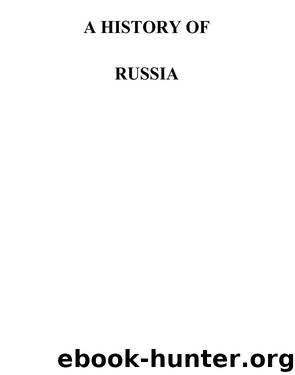A history of Russia by Riazanovsky

Author:Riazanovsky
Language: eng
Format: epub
supervising and inspecting schools in Russia, and the emperor's assistants followed his example.
The restrictive policies of the Ministry of Education resulted logically from its social views and aims. In order to assure that each class of Russians obtained only "that part which it needs from the general treasury of enlightenment," the government resorted to increased tuition rates and to such requirements as special certificates of leave that pupils belonging to the lower layers of society had to obtain from their village or town before they could attend secondary school. Members of the upper class, by contrast, received inducements to continue their education, many boarding schools for the gentry being created for that purpose. Ideally, in the government's scheme of things - and reality failed to live up to the ideal - children of peasants and of lower classes in general were to attend only parish schools or other schools of similar educational level, students of middle-class origin were to study in the district schools, while secondary schools and universities catered primarily, although not exclusively, to the gentry. Special efforts were made throughout the reign to restrict the education of the serfs to elementary and "useful" subjects. Schools for girls, which were under the patronage of the empress dowager and the jurisdiction of the Fourth Department of His Majesty's Own Chancery, served the same aims as those for boys.
The inculcation of the true doctrine, that of Official Nationality, and a relentless struggle against all pernicious ideas constituted, as we know, essential activities of the Ministry of Education. Only officially approved views received endorsement, and they had to be accepted without question rather than discussed. Teachers and students, lectures and books were generally suspect and required a watchful eye. In 1834 full-time inspectors were introduced into universities to keep vigil over the behavior of students outside the classroom. Education and knowledge, in the estimate of the emperor and his associates, could easily become subversion! As already mentioned, with the revolutionary year of 1848 unrelieved repression set in.
Still, the government of Nicholas I made some significant contributions to the development of education in Russia. Thus, it should be noted that the Ministry of Education spent large sums to provide new buildings, laboratories, and libraries, and other aids to scholarship such as the excellent Pulkovo observatory; that teachers' salaries were substantially increased - extraordinarily increased in the case of professors, according to the University Statute of 1835; that, in general, the government of Nicholas I showed a commendable interest in the physical plant necessary for education and in the material well-being of those engaged in instruction. Nor was quality neglected. Uvarov in particular did much to raise educational and scholarly standards in Russia in the sixteen years during
Download
This site does not store any files on its server. We only index and link to content provided by other sites. Please contact the content providers to delete copyright contents if any and email us, we'll remove relevant links or contents immediately.
| Africa | Americas |
| Arctic & Antarctica | Asia |
| Australia & Oceania | Europe |
| Middle East | Russia |
| United States | World |
| Ancient Civilizations | Military |
| Historical Study & Educational Resources |
Red Famine: Stalin's War on Ukraine by Anne Applebaum(2459)
Chernobyl by Serhii Plokhy(2124)
Midnight in Chernobyl by Adam Higginbotham(2075)
The House of Government by Slezkine Yuri(1843)
Midnight in Chernobyl: The Untold Story of the World's Greatest Nuclear Disaster by Adam Higginbotham(1770)
Red Shambhala by Andrei Znamenski(1746)
The Gulag Archipelago (Vintage Classics) by Aleksandr Solzhenitsyn(1722)
From Cold War to Hot Peace by Michael McFaul(1711)
All the Kremlin's Men by Mikhail Zygar(1693)
Putin's Labyrinth(1655)
The Future Is History by Masha Gessen(1589)
Red Notice by Bill Browder(1587)
From Russia with Lunch by David Smiedt(1550)
A People's Tragedy by Orlando Figes(1539)
The Romanovs by Simon Sebag Montefiore(1484)
How to Tame a Fox (and Build a Dog): Visionary Scientists and a Siberian Tale of Jump-Started Evolution by Lee Alan Dugatkin & Lyudmila Trut(1466)
Putin's Labyrinth: Spies, Murder, and the Dark Heart of the New Russia(1453)
The Lost Spy by Andrew Meier(1395)
Art and Revolution by John Berger(1384)
